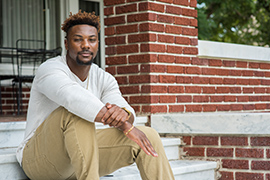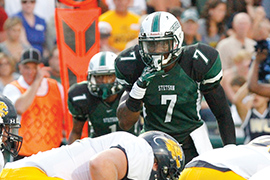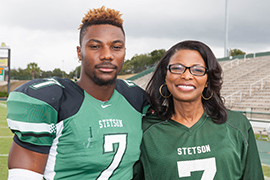Tackling Stereotypes


Donald Payne Jr. isn’t quite what you’d expect. On the football field, No. 7 in Stetson green runs from one sideline to the other with reckless abandon. He entered the 2016 season, his fourth at Stetson, with 424 total tackles and 243 career unassisted tackles, third-most in all of NCAA football. That includes 30 in one game as a sophomore.
A crushing safety, Payne became an instant star for a football program that was absent for 57 years. He ascended to All-American status in about the time he takes to sack a quarterback.
He’s on the National Football League’s radar, too, with many professional scouts projecting him as a likely draft selection — reportedly the first in Hatter history. That high regard comes despite playing at the Football Championship Subdivision level.
Yet, when he departs DeLand in just a few months, following the team’s 11th game this fall, he wants to be remembered not as merely an athlete who was able to achieve, but as an ambassador.
His words: “I want people to walk around campus, walk up to a janitor, a professor or a teammate and ask, ‘Remember that kid Donald Payne?’ I want them to say, ‘He was a nice guy, and he always was respectful, no matter who he was speaking to.’
“I want my legacy to be not just a great player, but as a great image for the school.”
How’s that for an impact hit?
It really wasn’t supposed to be that way. At the very least, it could not have been expected. When Payne arrived at Stetson in August 2012, he was just another hopeful among 120 or so others, trying for a chance at college football. He was a good player in high school, quite good, but apparently not good enough. Deemed smallish (he’s 6-foot-1, 220 pounds now) and a bit slow afoot, he drew only scant interest from recruiters and received few offers for his services. Ironically, he had the requisite bloodlines. His father, Donald Payne Sr., was an All-American defensive back at Morris Brown College in the 1970s, while his uncle, Ezra Johnson, had a 15-year NFL career.
At the urging of his mother, Sylvia Payne, he chose Stetson and a first- year football program with neither guarantees nor glory.
Games weren’t even scheduled for that startup year, although Payne did shine in practice. Stopwatches, he proved from the outset, don’t measure heart.
This isn’t about football, though. This is about finding yourself, growing as a person and, ultimately, leading.
Coming from small, private Landmark Christian School in Fayetteville, Ga., Payne was well-prepared for Stetson’s classroom rigor. Campus life was another matter. He was a 17-year-old freshman from metropolitan Atlanta, away from home for the first time. Payne was raised by a demanding but doting mother and had a little brother; his father died when he was 13. Football wasn’t welcomed with open arms by all on campus. There was no recent football tradition, either, or mentors to follow. Also, Payne — like many of the other incoming football players — was African-American. Stetson’s strong commitment to diversity and inclusion notwithstanding, times weren’t always easy.
“The whole football team was under the microscope,” he remembers. “We were bringing football back. We had to show them [classmates, faculty and the community] that we were student-athletes first. We had to show them that we’re just like anybody else.”
They showed them, particularly Payne.

Early on, while leaders emerged by virtue of talent on the football field, Payne went beyond. With stellar play and colorful “Mohawk” hair, he stood out, and he knew it. He embraced the challenge of scrutiny.
“I learned over time that people are watching at every moment,” he describes. “I’m representing not only myself, but I’m representing my family, this football program, and I’m representing this school as a whole.
“I also learned that leadership must have extreme ownership over both craft and teammates.”
“Now,” he adds, “we’re one of the biggest parts of Stetson. That was a big jump for some of us, but we were able to make it as a team.”
His leadership credo is simple: Make those around you better.
“A good leader gets his followers to where they want to go. But a great leader pushes his followers past their expectations,” he says.
Among others, he points to current and past coaches as key influences in his life, along with hometown mentor Durand Rice, director of athletics at Landmark Christian School.
As Payne grew in all respects, he wove himself into the very fabric of Stetson.
“There have been multiple times where he has demonstrated his leadership in advancing the team from an athletic-skills standpoint, but he also volunteers at other sporting events,” cites Athletics Director Jeff Altier. “He works as an usher at basketball, baseball and softball games. He’s consistently supporting the other programs, both visibly and with his encouragement.”
Impactful. Indelible.
At least two characteristics haven’t changed about Payne. One is his love to prove people right , an attitude that has a direct tie to football. He carries a chip on his shoulder, as the saying goes, about being ignored by big-school recruiters, noting, “A lot of people just waved me by.” As a result, he stands staunchly by the people who care, in his hometown and his Stetson community.
“The people who didn’t believe in me, I’m not trying to prove them wrong. But the people who did believe in me, I’m trying to prove them right,” asserts Payne, crediting his high school coach with that thinking.
Such motivation has lifted him to great football heights, but Payne also has already graduated with a degree in finance (and a minor in management) — receiving recognition for high academic achievement along the way. His work ethic was further evident this summer when he interned at a medical facility near campus, handling patient accounting, 7:30 a.m. to 4 p.m.
Another constant is personality. Payne has always exhibited ample measures of it.
“Being African-American and a football player at this school makes me different already,” he says. “But it’s given me a platform to express myself freely. I don’t think you can walk around this campus and have someone say that ‘Donald isn’t himself 24-7,’ because I definitely am.
“I just like to have fun. People know that I’m the leader on the field, when it comes between those lines. But at the end of the day, I’m going to joke with you and have fun with you.”

Later this fall might not be so joyful. Game 11 on the schedule is set for Saturday, Nov. 19, marking the end of Payne’s Hatter career. It could also mean a new beginning in the NFL. Maybe. That’s unknown. Of the NFL, he concedes, “That’s my goal. I want to be there; I want to get there. Anything in between the lines I have to do to get there, I’m working for it.”
If it doesn’t happen?
“Ohhh,” he responds slowly. “My mom always said, ‘Your body will wear out one day, but your mind will never.’” His backup plan includes blending his finance/management education with passions in criminal and social justice.
Amid that uncertainty, there are givens. Stetson has changed Donald Payne.
“It’s given me discipline on the football field, discipline in the classroom, discipline out and about,” he says. “I can honestly say I made lifelong friends here. It really has been a blessing to be here.”
Payne has returned the favor, both on the field and off.
“You get all that package wrapped up in somebody who’s a tremendous athlete,” Altier says. “And that is unique and novel and something special to Stetson.”
Payne, indeed, doesn’t want to be forgotten when he’s gone — especially by future Hatters needing help.
“I want them to be able to call me up in any crisis, about image or how others perceive them,” he says. “I want people to tell them, ‘You need to call Donald up and ask him.’”
# # #
Pioneering Spirit
Talk about leading the way. When the 120 or so hopeful souls with football dreams arrived on campus in August 2012, no one had come before them — at least not in 57 years. Yet, they pioneered college football back to Stetson, and they persevered in uncertain times. Today, 13 of those original players, from as far away as California, Illinois and New York, remain Hatters, each playing in his final season.
Donald Payne, of course, is among them. All, however, are worthy of applause. They ushered in a new era of growth on campus. Stetson research shows for every player who enrolled at the university, another 1.8 students resulted, simply because they wanted to be at a school that had football. In addition, by virtue of journey, hardship and triumph, these players personify values that are at the very core of the university’s mission.
Personal growth? Winners? Touchdown.
The original 13:
Glenn Adesoji, Memphis, Tenn., Integrative Health Science
Christopher Atkins, Jacksonville, Fla., Digital Arts
Davion Belk, Chicago, Ill., Marketing
Christopher Crawford, Lauderdale Lakes, Fla., Accounting
Patrick Fogarty, Savannah, Ga., Sports Business
Eric Fogle, Evans, Ga., Sports Business
Jonathan Jerozal, Canyon Country, Calif., Marketing
David Lazear, Newark, Del., Economics and Chemistry
Kegan Moore, Marietta, Ga., Business Administration
Donald Payne, Fayetteville, Ga., Finance
Matthew Wawrzyniak, Ponte Vedra Beach, Fla., Accounting
Dylan Wydronkowski, Glenville, N.Y., Business Administration/MBA
Mike Yonker, Cocoa Beach, Fla., Elementary Education
Note: This article originally appeared in the Fall 2016 issue of Stetson University Magazine. To read the entire magazine, click here. The next issue of the magazine is scheduled for publication this winter.



